
-
 Amorim eyes victory in first Man Utd home game to kickstart new era
Amorim eyes victory in first Man Utd home game to kickstart new era
-
Fresh fury as Mozambique police mow down protester

-
 Defeat at Liverpool could end Man City title hopes, says Gundogan
Defeat at Liverpool could end Man City title hopes, says Gundogan
-
Indonesians vote in regional election seen as test for Prabowo

-
 Guardiola says no intent to 'make light' of self harm in post-match comments
Guardiola says no intent to 'make light' of self harm in post-match comments
-
New EU commission gets green light to launch defence, economy push

-
 Opposition figures killed as Tanzania holds local election
Opposition figures killed as Tanzania holds local election
-
Taiwan Olympic boxing champion quits event after gender questions

-
 European stocks drop on Trump trade war worries
European stocks drop on Trump trade war worries
-
Volkswagen to sell operations in China's Xinjiang

-
 FA probes referee David Coote over betting claim
FA probes referee David Coote over betting claim
-
Serbia gripped by TV series about murder of prime minister

-
 Putin seeks to shore up ties on visit to 'friendly' Kazakhstan
Putin seeks to shore up ties on visit to 'friendly' Kazakhstan
-
New EU commission pushes for defence and economy spending

-
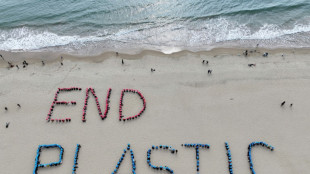 Plastic pollution talks must speed up, chair warns
Plastic pollution talks must speed up, chair warns
-
Pakistan web controls quash dissent and potential

-
 1,000 Pakistan protesters arrested in pro-Khan capital march
1,000 Pakistan protesters arrested in pro-Khan capital march
-
ICC prosecutor seeks arrest warrant for Myanmar junta chief

-
 Philippine VP's bodyguards swapped out amid investigation
Philippine VP's bodyguards swapped out amid investigation
-
EasyJet annual profit rises 40% on package holidays

-
 Ukraine sees influx of Western war tourists
Ukraine sees influx of Western war tourists
-
Greeks finally get Thessaloniki metro after two-decade wait

-
 New EU commission to get all clear with big push on defence and economy
New EU commission to get all clear with big push on defence and economy
-
Thousands of Lebanese head home as Israel-Hezbollah truce takes hold

-
 Australia takes step to ban under 16s from social media
Australia takes step to ban under 16s from social media
-
Volkswagen says to sell operations in China's Xinjiang

-
 Japan prosecutor bows in apology to former death row inmate
Japan prosecutor bows in apology to former death row inmate
-
Thailand to return nearly 1,000 trafficked lemurs, tortoises to Madagascar
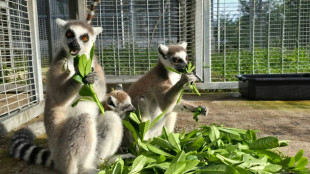
-
 Namibia votes with ruling party facing its toughest race yet
Namibia votes with ruling party facing its toughest race yet
-
Indian protest wrestler given four-year ban for avoiding dope test

-
 UK parliament to debate assisted dying law
UK parliament to debate assisted dying law
-
Ireland has a cultural moment, from rock and books to cinema

-
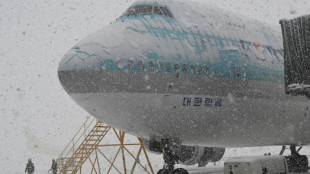 South Korean capital hit by record November snowfall: weather agency
South Korean capital hit by record November snowfall: weather agency
-
Sinn Fein hope election will propel it to power in Ireland

-
 Ceasefire takes hold in Israel-Hezbollah war
Ceasefire takes hold in Israel-Hezbollah war
-
Chinese island plastic pollution turned into artistic omens
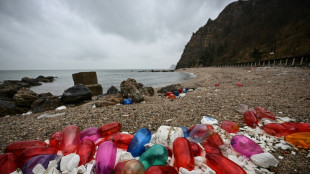
-
 Anti-mine treaty signatories slam US decision to send landmines to Ukraine
Anti-mine treaty signatories slam US decision to send landmines to Ukraine
-
Vietnamese EV maker Vinfast reports $550 million Q3 loss

-
 Hello Kitty owner plunges 17% on sharesale plan
Hello Kitty owner plunges 17% on sharesale plan
-
Giannis-less Bucks edge Heat, Rockets advance in NBA Cup

-
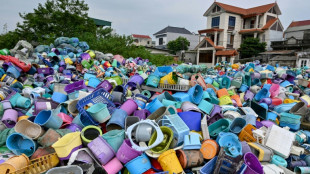 Environmentalists slam lobbyist influence on plastic talks
Environmentalists slam lobbyist influence on plastic talks
-
Global security hotspots awaiting Trump in 2025

-
 Eddie Jones tells Japan to keep faith after heavy defeats
Eddie Jones tells Japan to keep faith after heavy defeats
-
Five forgotten conflicts of 2024

-
 Adani Group says it lost nearly $55 bn as US charges sparked rout
Adani Group says it lost nearly $55 bn as US charges sparked rout
-
Bumper election year brings headwinds for liberal democracies

-
 New Zealand pace bowler Smith to make debut in first England Test
New Zealand pace bowler Smith to make debut in first England Test
-
Australia remembers cricketer Phillip Hughes 10 years after death

-
 Protesters for jailed ex-PM Khan cleared from Pakistan capital's centre
Protesters for jailed ex-PM Khan cleared from Pakistan capital's centre
-
'Very, very slow': plastic treaty talks grind forward
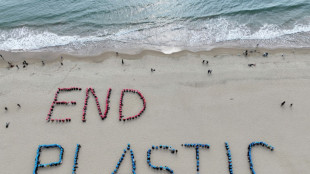

Kosovars tire of knocking at Europe's closed doors
Of all the passports in the world, Kosovo's opens fewer doors than most, even the doors to other parts of Europe.
"It's a contradiction to be called European when you are not allowed to see, touch or travel around Europe," 27-year-old journalist Aulona Kadriu told AFP.
"I don't see why an entire population should be locked out and isolated."
Of the 199 countries ranked by the number of destinations their passport holders can visit according to the Henley index, only 10 offer fewer opportunities than Kosovo. The former province of Serbia languishes in the company of places like Afghanistan, Syria, Yemen and North Korea.
Kadriu gave up trying to travel within Europe for work or for leisure, because she found the hoops Kosovars have to jump through too frustrating.
The landlocked country's 1.8 million citizens are the only people in the Balkans to need a visa to do so, and that magic pass is tricky to obtain.
"It's beyond humiliation," she grumbled.
- 'EU reservations' -
Kosovo declared independence from Serbia in 2008 but is not universally recognised.
Five European Union countries are among the opponents, alongside Serbia itself -- with whom relations remain unstable -- and its Russian and Chinese allies.
So the tiny country applauded when the European Commission -- the EU's executive body -- decided in 2018 that Kosovars should be eligible to travel freely to all 26 countries in Europe's borderless Schengen Area.
But EU governments, who have the final say, have yet to follow suit and four years on, Kosovars still need visas and the queues to get them are as long as ever.
Pensioner Igballe Kryeziu hopes to visit her children in Germany, where around half the 800,000 Kosovars living abroad currently reside.
It has taken her five months and 200 euros ($210) in paperwork just to get a place in the queue outside the consulate.
Work and study permits are just as hard to come by.
Berlin's embassy in Pristina said it had received more than 100,000 requests in December and January alone. It only has capacity to issue 5,500 in a full year.
- 'Stick but no carrot' -
Local charities believe the hold-up is due to reserves on the part of EU heavyweights like France about Kosovo's ability to tackle corruption and organised crime.
More than 80 local NGOs wrote recently to French President Emmanuel Macron, whose country holds the EU's rotating presidency, urging him to end the "isolation of Kosovo citizens".
Talks between Pristina and Brussels about visa-free travel had dragged on for 10 years, they pointed out -- longer than it took neighbouring Croatia to go from applying to join the EU to actually becoming a full member.
Deputy Prime Minister Besnik Bislimi told AFP Kosovo had "done more than was asked of it" to meet the conditions imposed on it and the delay was essentially "due to the dynamics between different EU members".
Political analyst Donika Emini concurred.
"We've seen the stick but not the carrot," she said.
Architecture student Teuta Rexhaj, 22, had to say goodbye to her plans to study at Vienna University.
"It was a real blow," she told AFP. "I belong to a generation that has not been able to fulfil its European dream."
"When I see other young people from the Balkans travelling to Europe without any difficulty, I can't help thinking Kosovo is being discriminated against."
D.Schneider--BTB
